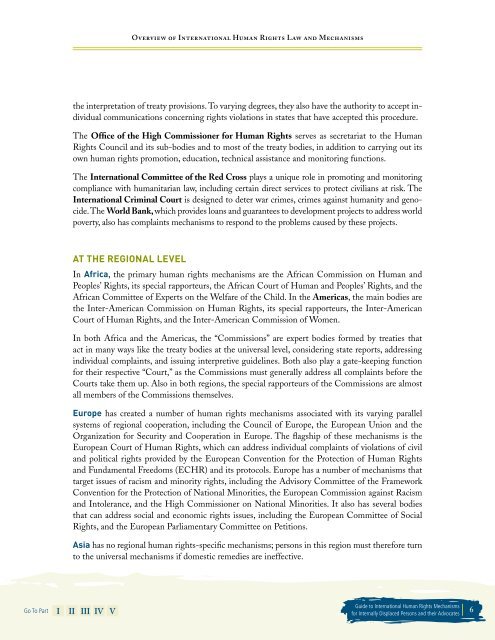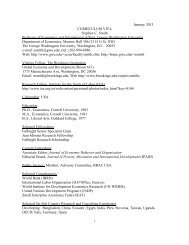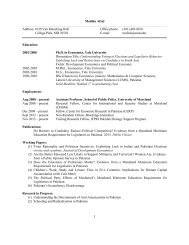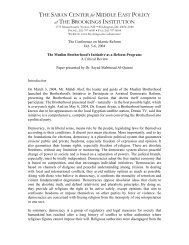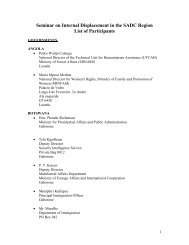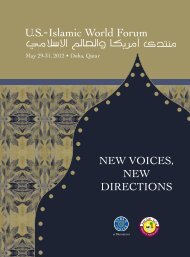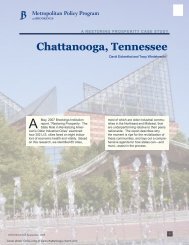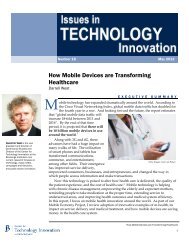Guide to International Human Rights Mechanisms - Brookings
Guide to International Human Rights Mechanisms - Brookings
Guide to International Human Rights Mechanisms - Brookings
You also want an ePaper? Increase the reach of your titles
YUMPU automatically turns print PDFs into web optimized ePapers that Google loves.
Go To Part I II III IV V<br />
Overview of <strong>International</strong> <strong>Human</strong> <strong>Rights</strong> Law and <strong>Mechanisms</strong><br />
the interpretation of treaty provisions. To varying degrees, they also have the authority <strong>to</strong> accept individual<br />
communications concerning rights violations in states that have accepted this procedure.<br />
The Office of the High Commissioner for <strong>Human</strong> <strong>Rights</strong> serves as secretariat <strong>to</strong> the <strong>Human</strong><br />
<strong>Rights</strong> Council and its sub-bodies and <strong>to</strong> most of the treaty bodies, in addition <strong>to</strong> carrying out its<br />
own human rights promotion, education, technical assistance and moni<strong>to</strong>ring functions.<br />
The <strong>International</strong> Committee of the Red Cross plays a unique role in promoting and moni<strong>to</strong>ring<br />
compliance with humanitarian law, including certain direct services <strong>to</strong> protect civilians at risk. The<br />
<strong>International</strong> Criminal Court is designed <strong>to</strong> deter war crimes, crimes against humanity and genocide.<br />
The World Bank,which provides loans and guarantees <strong>to</strong> development projects <strong>to</strong> address world<br />
poverty, also has complaints mechanisms <strong>to</strong> respond <strong>to</strong> the problems caused by these projects.<br />
aT The regional level<br />
In africa, the primary human rights mechanisms are the African Commission on <strong>Human</strong> and<br />
Peoples’ <strong>Rights</strong>, its special rapporteurs, the African Court of <strong>Human</strong> and Peoples’ <strong>Rights</strong>, and the<br />
African Committee of Experts on the Welfare of the Child. In the Americas, the main bodies are<br />
the Inter-American Commission on <strong>Human</strong> <strong>Rights</strong>, its special rapporteurs, the Inter-American<br />
Court of <strong>Human</strong> <strong>Rights</strong>, and the Inter-American Commission of Women.<br />
In both Africa and the Americas, the “Commissions” are expert bodies formed by treaties that<br />
act in many ways like the treaty bodies at the universal level, considering state reports, addressing<br />
individual complaints, and issuing interpretive guidelines. Both also play a gate-keeping function<br />
for their respective “Court,” as the Commissions must generally address all complaints before the<br />
Courts take them up. Also in both regions, the special rapporteurs of the Commissions are almost<br />
all members of the Commissions themselves.<br />
europe has created a number of human rights mechanisms associated with its varying parallel<br />
systems of regional cooperation, including the Council of Europe, the European Union and the<br />
Organization for Security and Cooperation in Europe. The flagship of these mechanisms is the<br />
European Court of <strong>Human</strong> <strong>Rights</strong>, which can address individual complaints of violations of civil<br />
and political rights provided by the European Convention for the Protection of <strong>Human</strong> <strong>Rights</strong><br />
and Fundamental Freedoms (ECHR) and its pro<strong>to</strong>cols. Europe has a number of mechanisms that<br />
target issues of racism and minority rights, including the Advisory Committee of the Framework<br />
Convention for the Protection of National Minorities, the European Commission against Racism<br />
and In<strong>to</strong>lerance, and the High Commissioner on National Minorities. It also has several bodies<br />
that can address social and economic rights issues, including the European Committee of Social<br />
<strong>Rights</strong>, and the European Parliamentary Committee on Petitions.<br />
asia has no regional human rights-specific mechanisms; persons in this region must therefore turn<br />
<strong>to</strong> the universal mechanisms if domestic remedies are ineffective.<br />
<strong>Guide</strong> <strong>to</strong> <strong>International</strong> <strong>Human</strong> <strong>Rights</strong> <strong>Mechanisms</strong><br />
for Internally Displaced Persons and their Advocates


